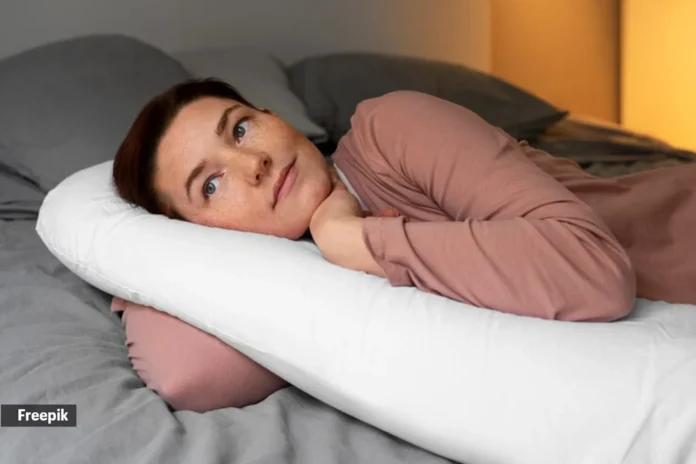Rocking yourself to sleep might seem like a simple childhood remedy, but recent scientific studies suggest that it could be an effective way to improve sleep quality for adults as well. Dr. Sarah Johnson, a sleep expert, delves into the science behind this age-old sleep hack.
According to Dr. Johnson, the act of rocking stimulates the vestibular system, which is responsible for balance and spatial orientation. This gentle motion activates the brain’s relaxation response, leading to a decrease in heart rate and blood pressure. As a result, individuals may find it easier to fall asleep and experience deeper, more restorative sleep throughout the night.
To maximize the benefits of rocking for sleep, Dr. Johnson recommends following a few simple guidelines. Firstly, choose a comfortable rocking chair or hammock that provides gentle, rhythmic motion without causing discomfort. It’s important to find a rocking rhythm that feels natural and soothing, as overly fast or erratic movements may have the opposite effect and disrupt sleep.
Additionally, Dr. Johnson suggests incorporating rocking into a bedtime routine to signal to the body that it’s time to wind down and prepare for sleep. Spending a few minutes rocking before getting into bed can help to relax the mind and body, making it easier to transition into sleep mode.
For those who don’t have access to a rocking chair or hammock, Dr. Johnson recommends exploring alternative methods of achieving a similar rocking motion. This could include using a rocking bed or mattress, investing in a rocking motion device, or simply gently swaying back and forth while standing or sitting.
While rocking yourself to sleep may not be a one-size-fits-all solution, Dr. Johnson believes that it can be a valuable tool for improving sleep quality, especially for individuals who struggle with insomnia or difficulty falling asleep. By harnessing the power of gentle motion to stimulate the body’s relaxation response, rocking has the potential to promote more restful and rejuvenating sleep.
In addition to its physiological benefits, rocking oneself to sleep has also been linked to psychological relaxation and stress reduction. The repetitive, rhythmic motion of rocking has a calming effect on the mind, helping to quiet racing thoughts and promote a sense of tranquility. This can be particularly beneficial for individuals who struggle with anxiety or stress-related sleep disturbances.
Furthermore, rocking has been shown to stimulate the release of endorphins, the body’s natural feel-good hormones. These neurotransmitters help to alleviate feelings of tension and promote a sense of well-being, making it easier to drift off into a peaceful slumber. By incorporating rocking into their bedtime routine, individuals may find that they wake up feeling more refreshed and rejuvenated.
Moreover, rocking can also serve as a form of mindfulness practice, allowing individuals to focus their attention on the present moment and cultivate a state of mindfulness. As they gently sway back and forth, individuals may find themselves becoming more attuned to their breath, sensations, and surroundings, leading to a deeper sense of relaxation and inner peace.
For parents of young children, rocking has long been recognized as a soothing technique to help babies and toddlers fall asleep. However, research suggests that the benefits of rocking extend beyond infancy, with studies showing that adults who rock themselves to sleep experience improvements in sleep quality and duration.
In a study published in the Journal of Sleep Research, researchers found that participants who rocked themselves to sleep experienced deeper, more restorative sleep compared to those who did not rock. These findings suggest that rocking may play a role in enhancing the restorative functions of sleep, such as memory consolidation and emotional processing.
Furthermore, rocking has been shown to have positive effects on sleep architecture, the pattern of sleep cycles that occur throughout the night. Research indicates that individuals who engage in rocking during sleep spend more time in slow-wave sleep, the deepest stage of non-REM sleep associated with physical and mental restoration. This suggests that rocking may promote more restful and rejuvenating sleep overall.
Despite the potential benefits of rocking for sleep, it’s important to note that individual preferences and comfort levels vary. While some people may find rocking to be a helpful sleep aid, others may prefer alternative methods of relaxation and sleep induction. Additionally, individuals with certain medical conditions or mobility issues may need to consult with a healthcare professional before incorporating rocking into their bedtime routine.
The science behind rocking oneself to sleep suggests that this age-old sleep hack could be a valuable tool for improving sleep quality and promoting relaxation. By harnessing the power of gentle motion to stimulate the body’s relaxation response, rocking has the potential to promote deeper, more restful sleep and enhance overall well-being. As research in this area continues to evolve, rocking may emerge as a safe, effective, and accessible strategy for achieving better sleep and optimal health.

